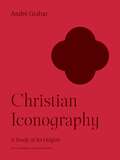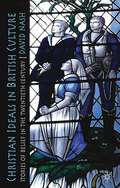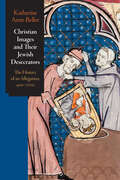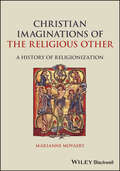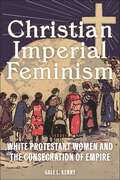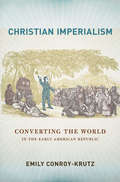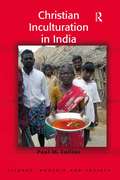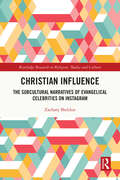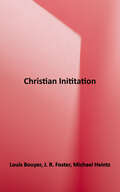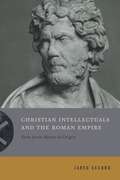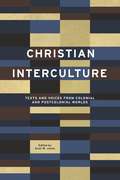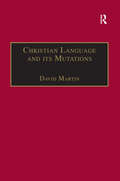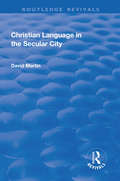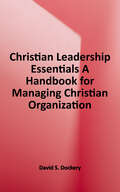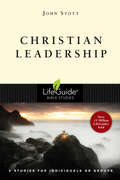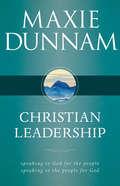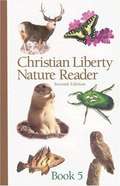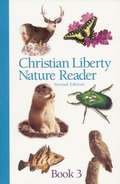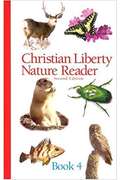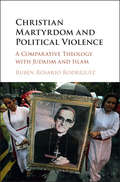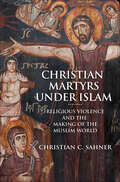- Table View
- List View
Christian Hymns
by The Evangelical Movement of WalesThis is a nondenominational collection of 942 hymns published in Wales and Welsh congregations are well-known for their excellent singiing. This collection, however, is words-only; the names of the hymn-tunes and their composers are not given. You may look them up on the website Hymnary.org. Some of the prolific hymn writers whose hymns are in this collection include Charles Wesley (84 hymns), Isaac Watts (59 hymns), The Moravian James Montgomery (26 hymns), the English non-conformist Philip Dodridge (19 hymns) and John Newton (the slave trader turned repentant Christian), (19 hymns). As with other hymnbooks on Bookshare, this too has DAISY markup for each hymn at level 2 and major subject breakdowns at level 1. There is an alphabetical index of first lines without punctuation to aid in searching for a hymn title. In a BRF file, Bookshare software will create a lengthy table of contents followed by the text of the hymn book. For other hymn collections on Bookshare see also The New Believers Hymn Book; Gospel Hymn Book; The United Methodist Hymnal; Glory to God (Presbyterian); Evangelical Lutheran Worship (ELCA); and Lutheran Servicebook: Psalms and Hymns (Missouri Synod). For texts of cantatas by Johann Sebastian Bach, see The Church Cantatas of J. S. Bach by Alec Robinson (with commentary), and Johann Sebastian Bach: The Complete Cantatas in German-English translations by Richard Stokes.
Christian Iconography: A Study of Its Origins (The A. W. Mellon Lectures in the Fine Arts #10)
by André GrabarAn illuminating look at the iconography of the early church and its important place in the history of Christian artIn this book, historian André Grabar demonstrates how early Christian iconography assimilated contemporary imagery of the time. Grabar looks at the most characteristic examples of paleo-Christian iconography, dwelling on their nature, form, and content. He explores the limits of originality in such art, its debt to figurative art, and the broader cultural climate in the Roman Empire, drawing a distinction between expressive images—that is, genuine works of art—and informative ones. Throughout, Grabar establishes the importance of imperial iconography in the development of Christian portraits and sheds light on the role they played alongside other forms of Christian piety in their day.
Christian Ideals in British Culture
by David NashThis book offers a challenge to conventional histories of secularisation by focusing upon the importance of central religious narratives. These narratives are changed significantly over time, but also to have been invested with importance and meaning by religious individuals and organisations as well as by secular ones.
Christian Images and Their Jewish Desecrators: The History of an Allegation, 400-1700 (Jewish Culture and Contexts)
by Katherine Aron-BellerIn Christian Images and Their Jewish Desecrators, historian Katherine Aron-Beller analyzes the common Christian charge that Jews habitually and compulsively violated Christian images, identifying this allegation as one that functioned alongside other anti-Jewish allegations such as ritual murder, blood libel, and host desecration to ultimately inform dangerous and long-lasting prejudices in medieval and early modern Europe. Through an analysis of folk tales, myths, legal proceedings, and religious art, Aron-Beller finds that narratives alleging that Jews committed violence against images of Christ, Mary, and the disciples flourished in Europe between the fifth and seventeenth centuries. She then explores how these narratives manifested differently across the continent and the centuries, finding that their potency reflected not Jewish actions per se, but Christians’ own concerns about slipping into idolatry when viewing depictions of religious figures. In addition, Aron-Beller considers Jews’ own attitudes toward Christian imagery and the ways in which they responded to and rejected—or embraced—such allegations. By examining how desecration allegations affected Jewish individuals and communities spanning Byzantium, medieval England, France, Germany, and early modern Spain and Italy, Aron-Beller demonstrates that this charge was a powerful expression of the Christian majority’s anxiety around committing idolatry and their eagerness to participate in practices of veneration that revolved around visual images—an anxiety that evolved through the centuries and persists to this day.
Christian Imaginations of the Religious Other: A History of Religionization
by Marianne MoyaertExplores how Christians created, used, and adapted religionized categories of non-Christians through the centuries Christian Imaginations of the Religious Other traces the genealogy of religionization, the various ways Christians throughout history have created a sense of religious normativity while simultaneously producing various categories of non-Christian "otherness." Covering a broad expanse of processes, practices, and socio-political contexts, this innovative volume analyzes the complex intersections of patterns of religionization in different eras while investigating their entanglements with racialization, sexualization, and ethnicization. With a readable and accessible style, Marianne Moyaert offers a nuanced and well-balanced critical analysis of how and why Christianity’s otherswere named, categorized, essentialized, and governed by those exemplifying Christian normativity in Western European society. The author takes a longue durée approach — a long-term perspective on history that extends past human memory and the archaeological record — that integrates different case studies and a variety of ecclesial, theological, and literary documents. Throughout the text, Moyaert demonstrates how religionization shaped the ways Christians classified people, organized Christian societies, interacted with different Christian and non-Christian groups, and more. Surveys the relationship between shifts in Christian normativity and the way non-Christians are imagined Helps readers connect the lasting effects of patterns of religionization with their everyday experiences Discusses the role of Christian expansion in the differential and unequal treatment of Christianity’s others Examines legal regulations and disciplinary practices that were established to define the boundaries between Christians and non-Christians Incorporates a wide range of scholarly resources, cutting-edge research, and the most recent insights and issues in the field Includes textboxes with helpful summaries, illustrations, and commentary in each chapter Christian Imaginations of the Religious Other: A History of Religionization is an excellent textbook for undergraduate and graduate courses ininterreligious studies, comparative theology, theological approaches to religious diversity, Christian-Jewish-Muslim relations, race and religion, and theorizing religion."Professor Moyaert is one of the world’s best scholars of comparative theology. In this magisterial new work, she helps scholars of religion to better learn how religious images, whether drawn with pictures or words, are crucial to how we understand ourselves and each other." - Amir Hussain, President, American Academy of Religion"Breathtaking in scope and detail, Moyaert offers an original history of the ways Christians have projected distorted images of their religious ‘others,’ with devastating material consequences. Her illuminating story of the past is a searchlight for our present." - Jeannine Hill Fletcher, Professor of Theology, Fordham University"Christian Imaginations is a superb study of the role that Western political programs play in the historical construction of identity boundaries. Analytically erudite and socially committed, Moyaert’s book powerfully interrogates what counts as religion making this text a must-read for anyone interested in interreligious studies." - Santiago Slabodsky, Florence and Robert Kaufman Professor in Jewish Studies, Hofstra University"Raising the historical formation of religious identities to the level of contemporary treatments of gender and racialization, Christian Imaginations of the Religious Other is essential reading for students of religion." - Michelle Voss, Professor of Theology and Past Principal, Emmanuel College of Victoria University in the University of Toronto"Crafting a Western European mosaic of religionization's turbulent
Christian Imperial Feminism: White Protestant Women and the Consecration of Empire (North American Religions)
by Gale L. KennyIlluminates how white American Protestant women embraced a racially specific version of socialinclusiveness that centered themselves as the normAmidst the global instability of the early twentieth century, white Christian American women embracedthe idea of an “empire of Christ” that was racially diverse, but which they believed they were uniquelyqualified to manage. America’s burgeoning power, combined with women’s rising roles within thechurch, led to white Protestant women adopting a feminism rooted in religion and imperialism.Gale L. Kenny examines this Christian imperial feminism from the women’s missionary movement tocreate a Christian world order. She shows that this Christian imperial feminism marked a break from anearlier Protestant world view that focused on moral and racial purity and in which interactions amongraces were inconceivable. This new approach actually prioritized issues like civil rights and racialintegration, as well as the uplift of women, though the racially diverse world Christianity it aspired towas still to be rigidly hierarchically ordered, with white women retaining a privileged place as guardians.In exposing these dynamics, this book departs from recent scholarship on white evangelical nationalismto focus on the racial politics of white religious liberalism. Christian Imperial Feminism adds a necessarylayer to our understanding of religion, gender, and empire.
Christian Imperialism: Converting the World in the Early American Republic (The United States in the World)
by Emily Conroy-KrutzIn 1812, eight American missionaries, under the direction of the recently formed American Board of Commissioners for Foreign Missions, sailed from the United States to South Asia. The plans that motivated their voyage were ano less grand than taking part in the Protestant conversion of the entire world. Over the next several decades, these men and women were joined by hundreds more American missionaries at stations all over the globe. Emily Conroy-Krutz shows the surprising extent of the early missionary impulse and demonstrates that American evangelical Protestants of the early nineteenth century were motivated by Christian imperialism—an understanding of international relations that asserted the duty of supposedly Christian nations, such as the United States and Britain, to use their colonial and commercial power to spread Christianity. In describing how American missionaries interacted with a range of foreign locations (including India, Liberia, the Middle East, the Pacific Islands, North America, and Singapore) and imperial contexts, Christian Imperialism provides a new perspective on how Americans thought of their country’s role in the world. While in the early republican period many were engaged in territorial expansion in the west, missionary supporters looked east and across the seas toward Africa, Asia, and the Pacific. Conroy-Krutz’s history of the mission movement reveals that strong Anglo-American and global connections persisted through the early republic. Considering Britain and its empire to be models for their work, the missionaries of the American Board attempted to convert the globe into the image of Anglo-American civilization.
Christian Inculturation in India (Liturgy, Worship and Society Series)
by Paul M. CollinsDrawing together international and Indian sources, and new research on the ground in South India, this book presents a unique examination of the inculturation of Christian Worship in India. Paul M. Collins examines the imperatives underlying the processes of inculturation - the dynamic relationship between the Christian message and cultures - and then explores the outcomes of those processes in terms of architecture, liturgy and ritual, and the critique offered of these outcomes, especially by Dalit theologians. This book highlights how the Indian context has informed global discussions, and how the decisions of the World Council of Churches, Vatican II and Lambeth Conferences have impacted upon the Indian context.
Christian Influence: The Subcultural Narratives of Evangelical Celebrities on Instagram (Routledge Research in Religion, Media and Culture)
by Zachary SheldonChristian Influence examines how understudied evangelical media celebrities use Instagram to cultivate religious authority and to convey distinctive subcultural narratives about evangelical values and culture today.The book explores the way that discrete kinds of evangelical celebrities—Celebrity Pastors, Women’s Ministry Leaders, Christian-Media Celebrities, and Secular-Media Celebrity Christians—all used Instagram across 2020–2021 to perform specific subcultural narratives to their followers. Detailing these narratives gives unique insights into how the authority of celebrities and the affordances of social media are combining to challenge the strictures of authority within evangelicalism and raises questions about celebrity power in the contemporary shaping and reshaping of evangelical culture.Christian Influence is a useful and timely read for scholars with an interest in evangelicalism specifically, or religion and religious studies, media and cultural studies, sociology of religion, and communication more broadly.
Christian Initiation
by Louis BouyerChristian Initiation, first published in 1958, serves in many ways as a point of entry for the magnificent theological oeuvre of Louis Bouyer. Addressing the central elements of the Christian faith in a simple and straightforward manner, the book is meant as an initiation into Christian truth and life for those who profess—or hope to profess—faith in Jesus Christ. <p><p>Each chapter is a “discovery” of that new life that Christ brings to the believer, infusing each and every experience with the light of his own risen glory. In Christian Initiation, as in all his works, Bouyer emphasizes that the truth of the Gospel is a life to be lived in Christ Jesus and passed along, through sacramental grace, to his disciples for the joyful integration of truth and life.
Christian Intellectuals and the Roman Empire: From Justin Martyr to Origen (Inventing Christianity #2)
by Jared SecordEarly in the third century, a small group of Greek Christians began to gain prominence and legitimacy as intellectuals in the Roman Empire. Examining the relationship that these thinkers had with the broader Roman intelligentsia, Jared Secord contends that the success of Christian intellectualism during this period had very little to do with Christianity itself.With the recognition that Christian authors were deeply engaged with the norms and realities of Roman intellectual culture, Secord examines the thought of a succession of Christian literati that includes Justin Martyr, Tatian, Julius Africanus, and Origen, comparing each to a diverse selection of his non-Christian contemporaries. Reassessing Justin’s apologetic works, Secord reveals Christian views on martyrdom to be less distinctive than previously believed. He shows that Tatian’s views on Greek culture informed his reception by Christians as a heretic. Finally, he suggests that the successes experienced by Africanus and Origen in the third century emerged as consequences not of any change in attitude toward Christianity by imperial authorities but of a larger shift in intellectual culture and imperial policies under the Severan dynasty. Original and erudite, this volume demonstrates how distorting the myopic focus on Christianity as a religion has been in previous attempts to explain the growth and success of the Christian movement. It will stimulate new research in the study of early Christianity, classical studies, and Roman history.
Christian Intellectuals and the Roman Empire: From Justin Martyr to Origen (Inventing Christianity)
by Jared SecordEarly in the third century, a small group of Greek Christians began to gain prominence and legitimacy as intellectuals in the Roman Empire. Examining the relationship that these thinkers had with the broader Roman intelligentsia, Jared Secord contends that the success of Christian intellectualism during this period had very little to do with Christianity itself.With the recognition that Christian authors were deeply engaged with the norms and realities of Roman intellectual culture, Secord examines the thought of a succession of Christian literati that includes Justin Martyr, Tatian, Julius Africanus, and Origen, comparing each to a diverse selection of his non-Christian contemporaries. Reassessing Justin’s apologetic works, Secord reveals Christian views on martyrdom to be less distinctive than previously believed. He shows that Tatian’s views on Greek culture informed his reception by Christians as a heretic. Finally, he suggests that the successes experienced by Africanus and Origen in the third century emerged as consequences not of any change in attitude toward Christianity by imperial authorities but of a larger shift in intellectual culture and imperial policies under the Severan dynasty. Original and erudite, this volume demonstrates how distorting the myopic focus on Christianity as a religion has been in previous attempts to explain the growth and success of the Christian movement. It will stimulate new research in the study of early Christianity, classical studies, and Roman history.
Christian Interculture: Texts and Voices from Colonial and Postcolonial Worlds (World Christianity #3)
by Arun W. JonesDespite the remarkable growth of Christianity in Africa, Asia, and Latin America in the twentieth century, there is a dearth of primary material produced by these Christians. This volume explores the problem of writing the history of indigenous Christian communities in the Global South.Many such indigenous Christian groups pass along knowledge orally, and colonial forces have often not deemed their ideas and activities worth preserving. In some instances, documentation from these communities has been destroyed by people or nature. Highlighting the creative solutions that historians have found to this problem, the essays in this volume detail the strategies employed in discerning the perspectives, ideas, activities, motives, and agency of indigenous Christians. The contributors approach the problem on a case-by-case basis, acknowledging the impact of diverse geographical, cultural, political, and ecclesiastical factors.This volume will inspire historians of World Christianity to critically interrogate—and imaginatively use—existing Western and indigenous documentary material in writing the history of Christianity in Asia, Africa, the Americas, and Oceania.In addition to the editor, the contributors to this volume include J. J. Carney, Adrian Hermann, Paul Kollman, Kenneth Mills, Esther Mombo, Mrinalini Sebastian, Christopher Vecsey, Haruko Nawata Ward, and Yanna Yannakakis.
Christian Interculture: Texts and Voices from Colonial and Postcolonial Worlds (World Christianity)
by Arun W. JonesDespite the remarkable growth of Christianity in Africa, Asia, and Latin America in the twentieth century, there is a dearth of primary material produced by these Christians. This volume explores the problem of writing the history of indigenous Christian communities in the Global South.Many such indigenous Christian groups pass along knowledge orally, and colonial forces have often not deemed their ideas and activities worth preserving. In some instances, documentation from these communities has been destroyed by people or nature. Highlighting the creative solutions that historians have found to this problem, the essays in this volume detail the strategies employed in discerning the perspectives, ideas, activities, motives, and agency of indigenous Christians. The contributors approach the problem on a case-by-case basis, acknowledging the impact of diverse geographical, cultural, political, and ecclesiastical factors.This volume will inspire historians of World Christianity to critically interrogate—and imaginatively use—existing Western and indigenous documentary material in writing the history of Christianity in Asia, Africa, the Americas, and Oceania.In addition to the editor, the contributors to this volume include J. J. Carney, Adrian Hermann, Paul Kollman, Kenneth Mills, Esther Mombo, Mrinalini Sebastian, Christopher Vecsey, Haruko Nawata Ward, and Yanna Yannakakis.
Christian Language and its Mutations: Essays in Sociological Understanding (Theology and Religion in Interdisciplinary Perspective Series)
by David MartinChristian Language and its Mutations explores how Christian language alters in various social, cultural, historical and religious contexts. Having delineated the core language of Christianity, David Martin analyses how it mutates in different historical and social contexts, notably: peace and war; the arts - particularly painting and music; the sacred space (the city) and the sacred text (the liturgy); education; and the global situation of Christianity and contemporary secular society - evangelicalism, rational religion, Pentecostalism and Base Communities. Presenting a unique perspective to show how and why Christianity alters according to context, this book will prove insightful and accessible to students, clergy and general readers alike. David Martin is Honorary Professor in the Department of Religious Studies, Lancaster University, and Emeritus Professor of Sociology at the London School of Economics, UK. He is the author of some two dozen books, including many landmark titles in the sociology of religion.
Christian Language in the Secular City (Routledge Revivals)
by David MartinThis title was first published in 2002.Christian Language in the Secular City offers a series of meditations by the internationally renowned sociologist, David Martin. Martin presents a distinctive angle of vision on key issues of Christian faith, dividing the book into three clear sections: the Liturgical Year; the Christian agenda, including prophecy, justification, sacred places and spaces, wisdom, providence, peace and war, angelic and demonic; and Emergent Occasions such as the fall of the Berlin Wall, the 900th anniversary of Winchester Cathedral, commemoration of poets and of martyrs, and more. With its uniquely lyrical presentation, David Martin's book transposes central issues of theology and Christian faith into a new key. This work complements David Martin's theoretical book focusing on Christian Language and its Mutations, published in Ashgate's Religion and Theology in Interdisciplinary Perspective series. David Martin is Honorary Professor in the Department of Religious Studies, Lancaster University, and Emeritus Professor of Sociology at the London School of Economics, UK. He is the author of some two dozen books, including Divinity in a Grain of Bread, and many landmark titles in the sociology of religion.
Christian Law
by Norman DoeChristian Law: Contemporary Principles offers a detailed comparison of the laws of churches across ten distinct Christian traditions worldwide: Catholic, Orthodox, Anglican, Lutheran, Methodist, Reformed, Presbyterian, United, Congregational and Baptist. From this comparison, Professor Doe proposes that all denominations of the faith share common principles in spite of their doctrinal divisions; and that these principles reveal a concept of 'Christian law' and contribute to a theological understanding of global Christian identity. Adopting a unique interdisciplinary approach, the book provides comprehensive coverage on the sources and purposes of church law, the faithful (lay and ordained), the institutions of church governance, discipline and dispute resolution, doctrine and worship, the rites of passage, ecumenism, property and finance, as well as church, state and society. This is an invaluable resource for lawyers and theologians who are engaged in ecumenical and interfaith dialogue, showing how dogmas may divide but laws link Christians across traditions.
Christian Leadership Essentials: A Handbook for Managing Christian Organization
by David S. DockeryThis book finds university president David S. Dockery assembling a great wealth of tried and true insights on the distinctive methods of leading Christian organizations and institutions. No matter how much experience a faith-based leader may already have, there are plenty of fresh thoughts and indispensable guiding principles here on topics including finance and budget planning, mission and vision, employee relations, theological foundations, mentoring, crisis management, and more. A majority of the nineteen contributors are active academic presidents, including Robert B. Sloan (Houston Baptist University; "A Biblical Model of Leadership"), Judson Carlberg (Gordon College; "Managing the Organization"), Jon Wallace (Azusa Pacific University; "Financial Oversight and Budget Planning"), Evans Whitaker (Anderson University [South Carolina]; "Development, Campaigns, and Building Projects"), Carl Zylstra (Dordt College; "Accreditation and Government Relations"), Jim Edwards (Anderson University [Indiana]; "Relationships with Multiple and Various Constituencies"), Phil Eaton (Seattle Pacific University; "Employee Relations in a Grace-filled Community"), Barry Corey (Biola University; "Engaging the Culture"), and Randall O'Brien (Carson-Newman College; "The Leader as Mentor and Pastor").
Christian Leadership: Biblical Models Of Church, Gospel And Ministry (LifeGuide Bible Studies)
by John StottThe most influential leader in the early church was undoubtedly the apostle Paul. He never lost the vision of God's single new humanity���Jews and Gentiles together. And in his letters we watch him exercising his leadership skills among the early Christians. This nine-session LifeGuide Bible Study by John Stott is based on his book Basic Christian Leadership and covers the first four chapters of 1 Corinthians, in which Paul responds to a complex church situation and to questions the Corinthians have addressed to him. He does so with clarity, wisdom, humility, love and gentleness���qualities that we can learn from as leaders today. For over three decades LifeGuide Bible Studies have provided solid biblical content and raised thought-provoking questions���making for a one-of-a-kind Bible study experience for individuals and groups. This series has more than 130 titles on Old and New Testament books, character studies, and topical studies.
Christian Leadership: Speaking to God for the people, speaking to God for the people
by Maxie DunnamThe bedrock grounding of church leaders is in God. This grounding comes through deliberate and explicit attention to God through prayer and self-reflection. Leadership as vocation, Christian leadership, begins with self-leadership, clarifying one's own heart, one's whole being, and one's mind in order to find and show that one's most basic identity and deepest and most concrete security lie in God—not in success or in pleasing someone else or in being seen as a good person or being loved by a congregation or the faith community we lead. Contents includes: The Vocation of Leadership The Shape of Our Vocation Lessons From the Saints What is Good Ministry? The Persons We Are and the Institutions We Serve The Preacher and Preaching Taking Care of Ourselves in the Everyday Time: It's Ours to Receive, Use, and Manage Staying Alive All Our Ministry Life
Christian Liberty Nature Reader (Book Five)
by Worthington Hooker Michael J. McHughThis particular textbook is designed not only to improve a student's reading skills and comprehension, but also to increase the student's understanding of and interest in God's wonderful creation.
Christian Liberty Nature Reader Book Three
by Julia Mcnair Wright Edward J. ShewanThis reader exposes students to the daily routine of various animals. Review questions are provided in the text to help instructors evaluate the comprehension level of each reader.
Christian Liberty Nature Reader: Book 4
by Michael McHughThis fascinating text provides supplemental reading for students interested in learning more about animals. Numerous illustrations and helpful chapter comprehension questions are included with this reader. (Christian Liberty Press) Grade: 4th
Christian Martyrdom and Political Violence: A Comparative Theology with Judaism and Islam
by Rubén Rosario RodríguezIn recent years, martyrdom and political violence have been conflated in the public imagination. Rubén Rosario Rodríguez argues that martyr narratives deserve consideration as resources for resisting political violence in contemporary theological reflection. Underlying the three Abrahamic monotheistic traditions is a shared belief that God requires liberation for the oppressed, justice for the victims and, most demanding of all, love for the political enemy. Christian, Jewish and Muslim martyr narratives that condone political violence - whether terrorist or state-sponsored - are examined alongside each religion's canon, in order to evaluate how central or marginalized these discourses are within their respective traditions. Primarily a work of Christian theology in conversation with Judaism and Islam, this book aims to model religious pluralism and cooperation by retrieving distinctly Christian sources that nurture tolerance and facilitate coexistence, while respecting religious difference. Examines the foundational scriptures of Christianity, Judaism and Islam to reveal what they have in common, facilitating discussion of controversial and divisive issues among the three Abrahamic religions. Engages in a 'theological' reading of martyrdom in all three Abrahamic traditions to encourage public and interreligious dialogue from a confessional point of view, a much-needed corrective to the dominant discourse in the media that ignores or marginalizes religious perspectives. Through engaging the contributions of Latin American liberation theology - specifically God's preferential option for the poor and oppressed - this work defends a Christian biblical theological perspective that has profound parallels with Judaism and Islam, and should facilitate interfaith dialogue on political violence.
Christian Martyrs under Islam: Religious Violence and the Making of the Muslim World
by Christian C. SahnerA look at the developing conflicts in Christian-Muslim relations during late antiquity and the early Islamic eraHow did the medieval Middle East transform from a majority-Christian world to a majority-Muslim world, and what role did violence play in this process? Christian Martyrs under Islam explains how Christians across the early Islamic caliphate slowly converted to the faith of the Arab conquerors and how small groups of individuals rejected this faith through dramatic acts of resistance, including apostasy and blasphemy.Using previously untapped sources in a range of Middle Eastern languages, Christian Sahner introduces an unknown group of martyrs who were executed at the hands of Muslim officials between the seventh and ninth centuries CE. Found in places as diverse as Syria, Spain, Egypt, and Armenia, they include an alleged descendant of Muhammad who converted to Christianity, high-ranking Christian secretaries of the Muslim state who viciously insulted the Prophet, and the children of mixed marriages between Muslims and Christians. Sahner argues that Christians never experienced systematic persecution under the early caliphs, and indeed, they remained the largest portion of the population in the greater Middle East for centuries after the Arab conquest. Still, episodes of ferocious violence contributed to the spread of Islam within Christian societies, and memories of this bloodshed played a key role in shaping Christian identity in the new Islamic empire.Christian Martyrs under Islam examines how violence against Christians ended the age of porous religious boundaries and laid the foundations for more antagonistic Muslim-Christian relations in the centuries to come.

